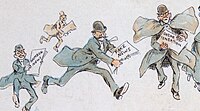
Photo from wikipedia
ABSTRACT A confluence of circumstances in US public life, including the proliferation of digital media outlets, the diminished role of information gatekeepers, and entrenched ideological polarization, have made one of… Click to show full abstract
ABSTRACT A confluence of circumstances in US public life, including the proliferation of digital media outlets, the diminished role of information gatekeepers, and entrenched ideological polarization, have made one of the core competencies of political engagement — staying informed about current events — an increasingly fraught endeavor. Fears about misinformation, bias, and “fake news” have spawned an array of curricular resources aimed at helping educators teach students how to analyze information sources in hopes that a common foundation of knowledge will contribute to reasoned and productive civic debate. In this article, we argue that analyzing news sources is a necessary but insufficient skill for fostering dialogue in public life. We suggest that the development of authentic connections across partisan divides require more expansive literacies grounded in civic storytelling, inquiry, and collaborative social dreaming. We draw upon the practices of 2 learning communities to offer principles and strategies for fostering such culturally relevant media literacies.
Journal Title: Theory Into Practice
Year Published: 2021
Link to full text (if available)
Share on Social Media: Sign Up to like & get
recommendations!